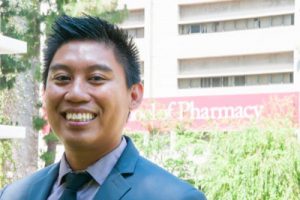Patrick Tabon joined the faculty at USC Mann in August 2017 as an Assistant Professor of Clinical Pharmacy. His clinical practice sites include USC Medical Plaza Pharmacy and Keck Medical Center of USC. He also works with the Geriatric Workforce Enhancement Project as a geriatric clinical pharmacist in developing Age Friendly Clinical Services for Eisner Health. He is the Co-Coordinator of the Residency Teaching Certificate Program for USC and USC Affiliate Pharmacy Residencies.
Tabon received his doctor of pharmacy from Washington State University in 2012. Upon graduation, he completed a PGY-1 Pharmacy Practice Residency at Swedish Medical Center in Seattle. He holds board certification in pharmacotherapy, geriatric pharmacy and ambulatory care pharmacy as well as being a licensed advanced practice pharmacist in California. He has clinical pharmacy experience in a variety of settings including community, acute care and managed care practice settings. He has worked as a heart failure disease manager and with geriatric patients in Orange County prior to his faculty appointment. He has added experience in specialty medication reviews, population health analytics, and pharmacy leadership. He is an active member in the California Pharmacists Association (CPhA) and continues to be involved with student leadership development and mentorship. He graduated from CPHA’s Leader Development Institute in 2017 and continues to serve as a learning coordinator for the organization.
Tabon was a 2016 OptumCare National Superhero Award recipient for his work in developing new models of care utilizing technology and pharmacist-based services. He has been recognized as the 2021 CPhA Distinguished New Practitioner of the Year. He has received awards by the USC student pharmacists for Professor and Preceptor of the Year and from the USC Residency Classes of 2021 and 2022 as Teaching Mentor of the Year and Preceptor of the Year.
Tabon’s research interests include pharmacy services to improve outcomes and patient safety during transitions in care, expanding community based clinical services and health screenings, developing student pharmacists’ leadership skills and understanding the role population health analytics to identify high-risk patient populations for hospital admissions.


